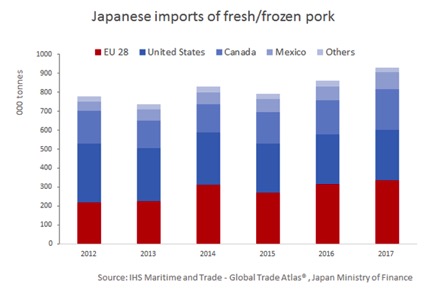The Economic Partnership Agreement negotiated in December will strengthen the ties between Europe and Japan. According to the European Commission, the EU will eventually have practically tariff free access to Japan for both fresh and processed pork. This will give a competitive advantage to EU exporters over those from the US, which will continue to face tariffs. The relaxation of trade restrictions on access to the fast growing market for processed products could provide a particular opportunity. The Commission will submit the agreement for the approval of the European Parliament and EU Member States, aiming for its entry into force before the end of the current mandate of the European Commission in 2019.
After China, Italy and Germany, Japan is the world’s fourth biggest importer of fresh and frozen pork, and the importance of this already huge market is still growing. EU exporters sent 335,000 tonnes of pork to Japan in 2017, according to Japan’s Ministry of Finance.
For the first time since 2008, this included the UK, exporting 57,000 tonnes of frozen product.
Domestic production in Japan has been stable for the last ten years at around 1.25 million tonnes per year, although the sector has seen continuous consolidation and growing farm sizes. At the same time, consumption has been growing steadily, and is now around 2.75 million tonnes per year, according to GIRA. It is largely demand for fresh chilled product that is driving import growth, particularly into the food service and ready to eat markets. The EU however tends to serve the frozen market, which still makes up more than half Japan’s imports.




